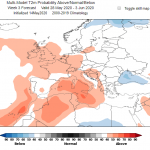Diverse, global audience is highlight of successful 3rd Copernicus Climate Change Service (C3S) Symposium for the Energy Sector
Hosted online 19 May 2020
The 3rd Copernicus Climate Change Service (C3S) Symposium for the Energy Sector workshop, organised by the World Energy and Meteorology Council (WEMC), provided the opportunity to explore the production of data and methodology in more depth and invite audience feedback on how we can improve it going forward.
The event attracted specialists from around 50 countries working in the energy and meteorology sectors and was attended by a varied global representation of government agencies, private commercial organisations, NGOs and academia within the energy and climate sectors.
The workshop, chaired by Prof Alberto Troccoli (WEMC Director), was divided into two sessions.
Session 1 evidenced how the C3S-Energy operational service can benefit research, energy planning decisions and policy, in addition to its practical value to the end users of the data. There were presentations from the team outlining the data production and methodology. Presentations were made by Alberto Troccoli (WEMC) “C3S-Energy Operational Service”; Sylvie Parey (EDF); Raphael Legrand (Météo France) “C3S-Energy Overview and outlook: Seasonal Stream”; Robert Vautard (CEA) “Climate Projections for the Energy Sector”; and Luke Sanger (WEMC) “Demonstrator Development”.
Session 2 illustrated the application of C3S data using two case studies to demonstrate how the users, of the C3S data services can effectively extract value for their businesses. Dr. Joe Osborne’s (Met-Office) presentation on the “C3S-Energy Case Studies” outlined the significance of the project’s data in relation to two case studies undertaken with E.On (UK) and Envision (UK). Industry experts were invited to share their perceptions of the potential application of climate data in the energy sector. We had presentations from Gabriel Bareux (RTE) “Climate services in support of a TSO’s activities”; Alban Joyeau (ENTSOE) “Resource Adequacy and Climate Data”; Sarah Palmer (EOn) “Climate data in use”; Zedong Zhang (GEIDCO) “C3S-Energy Operational Service and Global Energy Interconnection”; Matteo DeFelice (JRC) “Data & evidence-informed policymaking”.
With active participation from 84 and 61 attendees in the morning and afternoon sessions, respectively there was also a varied regional representation including participants from France, Italy, Niger, Belgium, Spain, Morocco, Australia, India, the UK and USA. Feedback from the audience was positive and discussions were undertaken regarding the relevance of the C3S-Energy operational service to end-users such as energy regulators, financial and insurance brokers, utility engineers, transmission and distribution operators, meteorologists, climatologists, service providers, policy makers and energy industry executives.
Poll results
Three polls were undertaken during the Symposium to assess attendee engagement with the service. Respondents were interested in learning more about data production, methodology and application of the service within their relevant sector. Participants welcomed industry experts’ presentations on the prospective contribution of C3S-Energy in decision-making. This was seen as valuable in demonstrating the operational service’s capabilities to deliver improved solutions for activities specific to the energy sector, as well as add value to stakeholders.
The C3S-Energy operational system will continue to be maintained over the coming year, during which also a visual demonstrator embedded into the C3S Toolbox will be developed. Aside from updating the historical and seasonal forecast data streams once a month, there won’t be major developments regarding data provision for the time being. These may resume in the second half of 2021, depending on the priorities of the next phase of the Copernicus programme. WEMC will continue to manage the C3S-Energy service operations and updates will be provided via both C3S and WEMC communications.
WEMC is an organisation which works to promote and enhance interaction between the energy industry and the weather, climate and broader environmental sciences community.
You can benefit from future WEMC updates and opportunities:
- Sign-up to our newsletter
- Join our community on Twitter
- Become a WEMC member, this is free
- Find out more about organisational WEMC membership
- Follow us on LinkedIn



